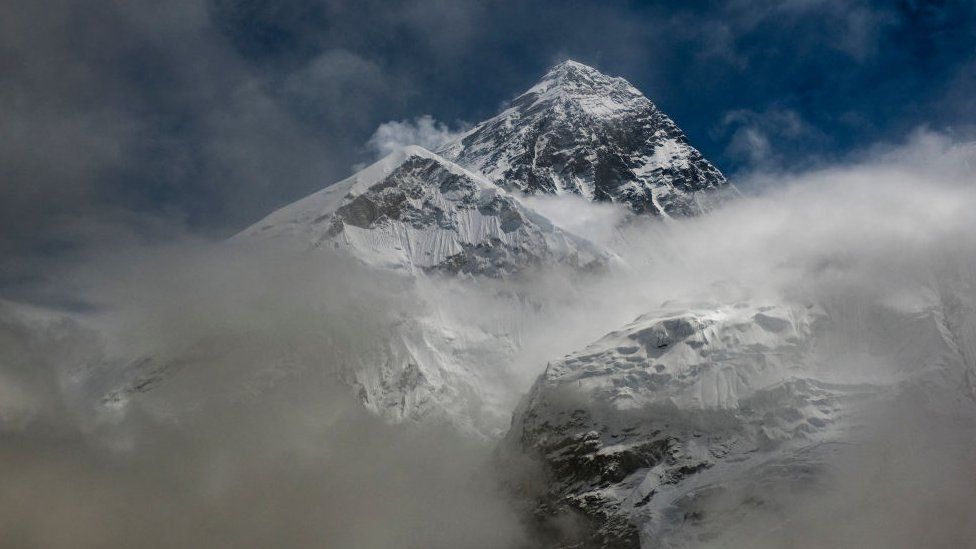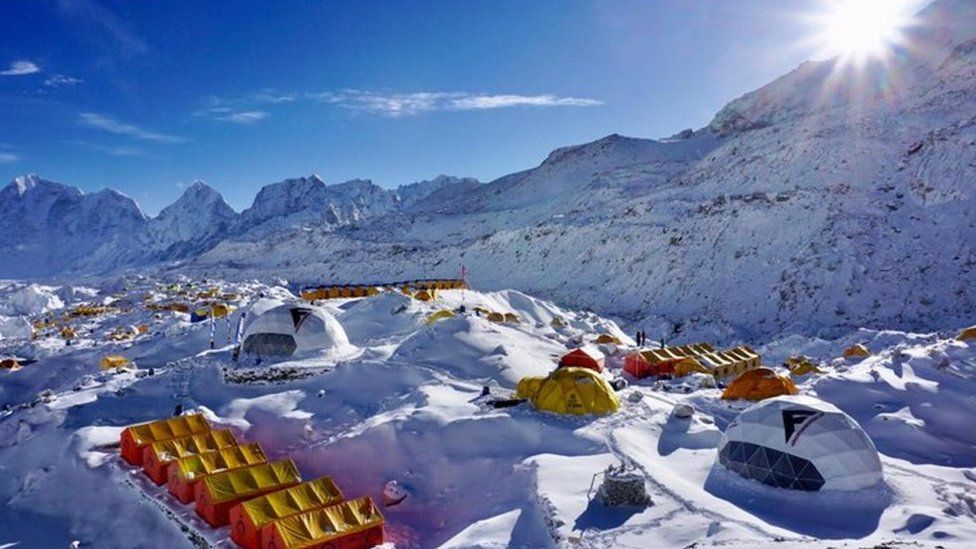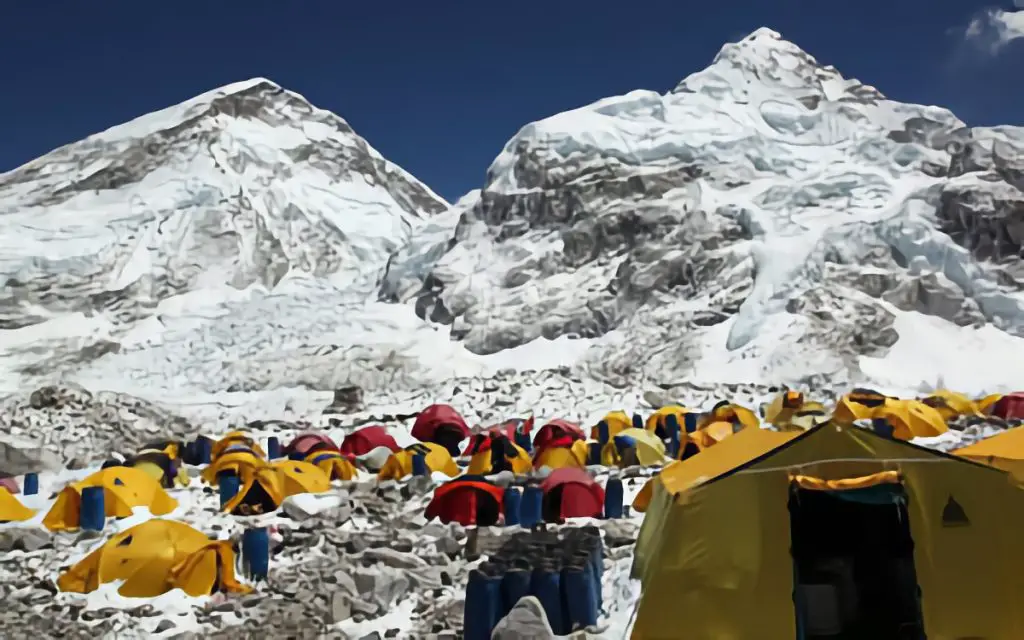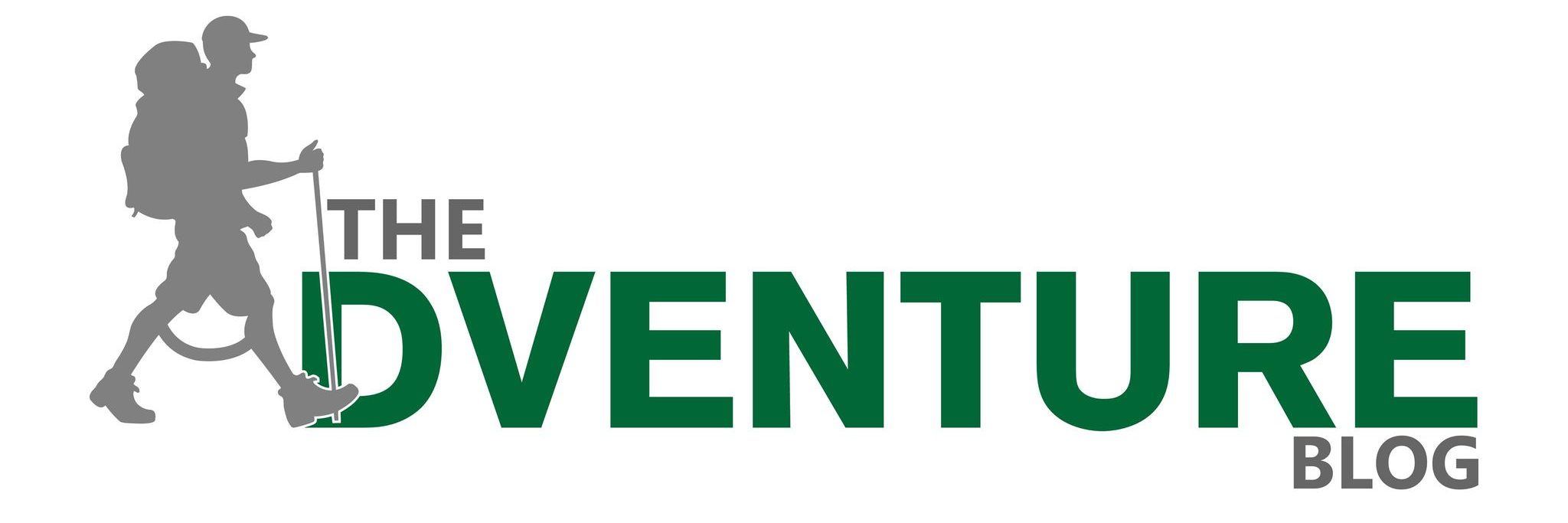COVID? It's Everywhere! Mount Everest!
 |
| Everest was closed to mountaineers last year due to the pandemic Getty Images |
"We don't have tests.""And high altitude makes it difficult to identify COVID from cough and HAPE [high altitude pulmonary edema], which is common here.""[There is a] dilemma [about whether to cancel the Everest climbing season]. Unventilated camps and camps close [to one another] make it easier to spread [COVID-19] here."Dr. Prakash Karel, Everest base camp physician"More than 30 people have already been evacuated to Kathmandu in helicopters with suspected pulmonary edema -- later found to be positive for the coronavirus."Pawel Michalski, Polish climber"I have taken a helicopter out of EBC [Everest base camp] back to Kathmandu after one day.""Once I was in the hospital a COVID test confirmed I was positive and had pneumonia. I've spent four nights in the ICU.""The COVID situation at EBC is a total s---storm. I had no clue what I was flying into."Gina Marie Hans-Lee, evacuated climber"The Nepal Government is still denying there is a COVID outbreak at Everest base camp, despite emerging evidence.""Why is the government hiding the truth?""At camp I saw many sick people. At a gorakshep [small village, last stop on most treks to base camp] hotel, there were [a] few sick climbers isolating, as well.""I found COVID is so common around the camp people. They took it so easily. One Sherpa told me, 'COVID is just like the flu."Rojita Adhikari, positive-tested climber, April 19
 |
| Health officials have warned of rising numbers of Covid-19 cases at base camp Lukas Furtenbach |
Nepal,
contiguously bordered with India, where a massive coronavirus wave has
spread, has seen itself well on the way to becoming overwhelmed with the
pathogen with an average of 6,700 cases reported daily up to May 5,
representing an increase from 1,100 a mere two weeks earlier. While the
country faces its steepest coronavirus wave yet encountered, it has
decided to keep the main tourist attraction -- the Nepali side of Mount
Everest -- open for business to foreigners hoping to climb the world's
tallest mountain.
The
2020 climbing season during the first introductory wave of the
SARS-CoV-2 virus causing COVID-19 had been cancelled. Now, during the
second COVID wave, turning out to be far more invasive, intense and
worrying, a record number of expedition permits totalling 408 have been
issued. Climbers and expedition leaders are left to work out for
themselves methods of containing the spread of the virus amidst growing
concerns of an outbreak of the coronavirus at the mountain.
The
issue of safety on behalf of visiting climbers and locals alike has
risen in the wake of multiple people being evacuated from base camp,
later tested in hospital for the virus, and found positive. A negative
coronavirus test is required by the Nepal Department of Tourism 72 hours
prior to entering the country but the government removed a seven-day
quarantine requirement in late March, in an effort to revive the
country's tourism industry.
At
$20-billion, tourism contributes about eight percent of the country's
GDP, with Everest expeditions alone contributing over $300 million to
the economy in 2019. On the mountain there is no way for climbers to
access tests, other than bringing along their own. The Everest base camp
clinic has no laboratory permission to test for the virus, leaving
guide companies to enact their own precautions.
Furtenbach Adventures, as an example, operates "flash expeditions", lasting
three to four weeks rather than the classic nine-week trip. Providing
climbers with hypoxic tents to help them become acclimated at home with
high altitudes, a process normally requiring a four-week stay at base
camp. Teams ranging in size from two to 29 members take other
precautions during the expeditions, but despite all precautions late
April saw the first case of coronavirus confirmed at base camp.
After
which reports of multiple people testing positive followed. The first
climber at base camp to test positive began feeling ill two days before
reaching base camp but thought he was suffering from mountain sickness
reflecting the high altitude. Mountain sickness can produce symptoms
similar to those of COVID. He remained unaware of his true condition
until tested three days later at a Kathmandu hospital.This year there is
an estimated 1,200 climbers at base camp, making social distancing
difficult.
Four
coronavirus cases were identified by the Nepal Mountaineering
Association; one local guide and three climbers. Those numbers are
challenged for accuracy by mountaineers' own experiences. Some climbers
who tested positive before or after leaving base camp insist that
unreported cases remain. One physician working out of the Everest base
camp clinic described to the Explorersweb blog, speaking anonymously,
the situation at base camp, that "many people" were evacuated with
coronavirus symptoms testing positive at the Kathmandu hospital.
"Many
climbers are isolated in their tents at the moment. In Kathmandu,
hospitals are not yet at full capacity, but ICUs are filling up quickly",
he said. The base camp Everest ER spoke of a meeting between doctors
and expedition leaders discussing managing respiratory illnesses,
including "encouraging
all to maintain their bubble/discouraging visits between camps, wearing
masks even within their camps, sending any members with respiratory
illness to see the doctors at Everest ER for further evaluation."
 |
 |
"Normally there's a lot of socializing, events, base camp parties, and teams are visiting other teams and making new friends.""We all used hypoxic tents at home, we sent them to the clients, and they simulate the oxygen level of higher altitude.""My guess is there will be more cases. Everyone is concerned about a message coming from the Department of Tourism: 'You all have to go home.'""We would expect that the government [would be] confirming these cases, keeping everything transparent, maybe even sending a team to base camp to do a mass test which would find superspreaders.""I think every operator would be happy to pay for this -- it would probably save the season, because there is the risk if there's more and more cases that [there] could be an early end to this season.""Your whole body is already working on its limits, so catching COVID would be a real threat to your health and even to your life.""If the weather's bad and someone's developing problems, evacuation without a helicopter would take days and it's very dangerous. So it would be a big problem if someone infected developed symptoms higher up the mountain.""If there are more and more cases coming in [at base camp], the authorities in Nepal will have to do something. I think they tried to do the right thing, they tried to save the season. But maybe it's not the right thing."Lukas Furtenbach, an expedition leader, Mera Peak, Everest"We're getting emails from people on other teams, trying to decide whether to go home, because it seems clear that things are getting quite serious.""I'm hearing from guides, Sherpas, and one of the helicopter companies about how many COVID rescues they're doing. I've had another major operator write me saying: 'You're so glad you didn't go.'""Every single person's respiratory system is struggling, and is working in overdrive, and it's that much more susceptible to upper respiratory illness [climbers face an intense physical battle with each step up the mountain].""You can't sleep at altitude, so you have this deep fatigue from days of not sleeping. You can't eat, because your digestive system is considered non-essential -- anything you put in your stomach, you become incredibly nauseous,""I think we'll start to see some climbers leaving because they just feel that they're on the wrong side of the moral question, with the Kathmandu outbreak being so strong. They're sitting there with thousands of bottles of oxygen."Adrian Ballinger, an expedition leader who pulled out of the Everest climbing season over COVID-19 concerns.
Climbers rejoiced when Nepal decided to reopen its side of Mount Everest this year, but reports suggest even the world's highest peak isn't safe from the spread of coronavirus. (Prakash Mathema/AFP/Getty Images)
Labels: Climbing Permits, COVID-19 Outbreaks, Evacuations, Himalaya, Mount Everest Base Camp, Nepal


<< Home